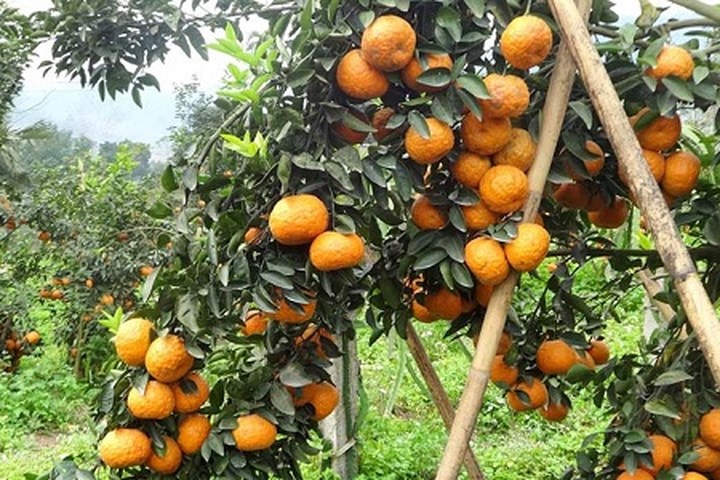
(HBĐT)-Going to visit the orange garden of the family of Mr. Bui Van Bach at Zone 3, Cao Phong town (in Cao Phong district), it is easy to see that each tree is pruned properly and has many fruits. This means that the farmer has been hard-working and making efforts to grown orange trees.
Mr. Bach said: "I was born at Ky Son district
in 1999 before going to Cao Phong for business. As a worker of Cao Phong Farm,
I and my family started to grown orange trees in 2000. At that time, the price
of orange was only from 3 to 5 thousand VND per kg, hence, the profits was
insignificant”.
In 2012, the family of Mr. Bui Van Bach
planted orange on the area of 10 hectares, and the area has currently increased
to 17 hectares. From March of 2014, his family participated in an orange
planting program following the VietGap standard and conformed to the
instruction of the program such as fertilizing, watering and applying proper
pesticides at the right time as well as the right time of safe separation, and
having a tidy and clean store and clear records.
In 2016, his family harvested 2 hundred tons
of orange, citrus and others which brought the income of 10 billion VND per
year, additionally, was awarded Certificate of clean orange in VietGap
standards. Afterward, the family could buy a car and build a new spacious house
with full facilities. Growing orange purposes on economic development, but Mr.
Bach also created more jobs for about 30 to 50 workers in the area. Moreover,
he always created favorable conditions and helped some households to grow
citrus.
In 2016, Mr. Bach and some orange farmer
established Cao Phong Planting Orange Association. It had a role to popularize
gardening techniques and caring guide as well as explore the marker for the
products of Cao Phong orange. The association had elected the Executive Board
and the Executive Committee which operated on the base of the Association’s
regulations in order to put it into an organized operation. As a consequence,
the Association’s products of orange usually met the demand of market and were
well-known by other provinces. In addition to showing good at business, Mr.
Bach is always enthusiastic and supporting the movements launched by the
government in the residential area, for example of donating 10 million VND to
construct cultural house, buy new equipment and create funds for merit
people.
According to data from the Hoa Binh Provincial Party Committee, the industrial production index for the first six months of 2025 is estimated to have increased by 20% compared to the same period last year. This marks the highest year-on-year growth rate for this period since 2020.
In the first six months of 2025, Hoa Binh province’s export turnover was estimated at 1.145 billion USD, marking an 18.11% increase compared to the same period in 2024. Import turnover was estimated at $ 804 million, a 17.15% increase, which helped the province maintain a positive trade balance.
The lives of the ethnic minority farmers in Tan Lac district have gradually improved thanks to the new directions in agricultural production. This is a testament to the collective strength fostered through the professional associations and groups implemented by various levels of the district’s Farmers’ Union.
With the motto the "product quality comes first,” after nearly one year of establishment and operation, Muong village’s Clean Food Agricultural and Commercial Cooperative, located in Cau Hamlet, Hung Son Commune (Kim Boi district), has launched reputable, high-quality agricultural products to the market that are well-received by consumers. The products such as Muong village’s pork sausage, salt-cured chicken, and salt-cured pork hocks have gradually carved out a place in the market and they are on the path to obtaining the OCOP certification.
In the past, the phrase "bumper harvest, rock-bottom prices" was a familiar refrain for Vietnamese farmers engaged in fragmented, small-scale agriculture. But today, a new spirit is emerging across rural areas of Hoa Binh province - one of collaboration, organisation, and collective economic models that provide a stable foundation for production.
Maintaining growing area codes and packing facility codes in accordance with regulations is a mandatory requirement for agricultural products to be eligible for export. Recently, the Department of Agriculture and Environment of Hoa Binh province has intensified technical supervision of designated farming areas and packing facilities to safeguard the "green passport" that enables its products to access international markets.


